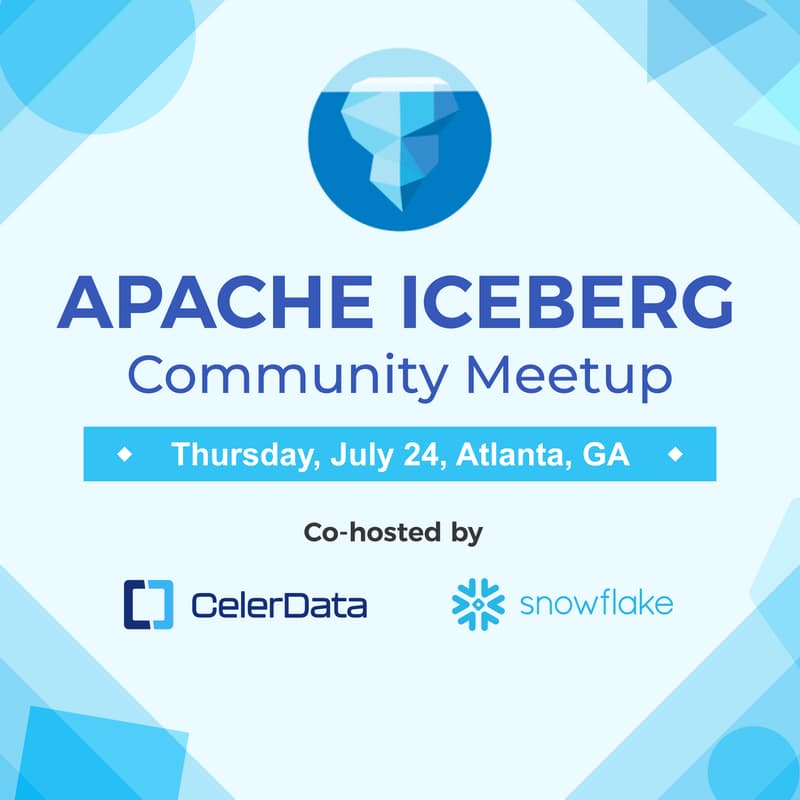

Apache Iceberg™ Meetup Atlanta
Apache Iceberg™ Meetup Atlanta! 🧊❄️
Join us on July 24th (Thursday) from 5:00-8:30 PM
At Snowflake Atlanta Office
Connect with fellow enthusiasts, share insights, and dive into the latest developments in the Apache Iceberg™ ecosystem! Whether you're a seasoned pro or new to Apache Iceberg, this meetup is the perfect place to exchange ideas and spark innovation.
Agenda
5:00p - 6:00p: Doors Open & Networking 💃
6:00p - 7:30p: Welcome Remarks & Presentations!
7:30p - 8:30p: More Networking 🕺
The event will focus on use cases around and innovations in Apache Iceberg (https://iceberg.apache.org/)
We will discuss topics around Open-Source Data Analytics, Open Table Formats (OTF), software concepts like Transactional Data Lakes or Lakehouse, advancements in AI/ML including generative AI, and many more topics of mutual interest that leverage Apache Iceberg.
During the sessions, we will provide you tips to get involved within the community, you will learn more about how the community is collaborating to grow the technology, and software/solutions that ease problem solving and improve user experiences.
Topic 1: Transactions and Isolation in Apache Iceberg™
We’ve all heard the hubbub, Apache Iceberg™ is an awesome new versatile table format that is packed with cutting edge features and supports transactions. But have you ever wondered how that transaction support actually works? What does the Iceberg Specification say about transactions? What is the Iceberg Specification? Have no fear, join us to walk through how Iceberg Transactions actually work and learn how various Isolation levels interact with Iceberg’s own validation mechanisms. We’ll work through the Apache Iceberg’s Spark Implementation of row level operations and explain how they interact with Iceberg’s underlying transaction mechanism. With this understanding, we’ll then explore what’s coming next for Apache Iceberg and how the REST specification is allowing for even finer grained commit validation in the future.
Russell Spitzer received his Ph.D from UCSF in 2013 after performing a lot of comparisons of protein binding sites. Following that, he became deeply invested in distributed computing and involved in several Apache projects. While working at Datastax he was a key contributor to the DataStax Spark-Cassandra Connector and also worked on many Apache projects. After leaving Datastax he worked at Apple growing the then nascent Apache Iceberg project where he worked on data file management and advancing the table format. Currently Russell working on OSS software at Snowflake and is a PMC member of the Apache Iceberg project, and PPMC member of the Apache Polaris (Incubating) project.
Topic 2: Adaptive Analytics with Iceberg
Apache Iceberg opens the possibility of new query architectures that enable users to write queries against Apache Iceberg tables and adaptively determine the best engine to execute those queries on. By reading Iceberg’s metadata, we push filter and partition pruning to the edge, and burst to cloud-warehouse compute only when local resources can’t keep up. The talk will unpack the architecture, performance benchmarks, and design patterns that make Iceberg-native analytics possible across this federated lakehouse landscape.
Matthew Mullins is CTO and co-founder at Coginiti, the collaborative data operations platform, where he leads the product and engineering teams. Local to Raleigh, he’d always rather be out fly fishing.
Topic 3: Accelerating Iceberg Queries with Materialized Views
Apache Iceberg brings openness and governance to the data lake, but delivering sub-second query performance remains a challenge for interactive and real-time workloads. To compensate, many teams copy data into proprietary systems, compromising the simplicity and integrity of their lakehouse architecture.
This session introduces a sustainable solution to this querying bottleneck: materialized views. We’ll explore how you can accelerate Apache Iceberg queries by materializing high-demand partitions in an optimized storage engine, without changing your schema or rewriting queries. Learn how this approach helps teams meet latency SLAs while preserving the openness and flexibility of their lakehouse.
Ron is a Developer Advocate at CelerData, where he helps bridge the gap between high-performance analytics technology and the data engineering community. Before joining CelerData, Ron worked at Jefferies, where he engineered real-time streaming systems and electronic trading infrastructure for fixed income products. His work focused on ultra-low-latency performance, reliability, and data integrity in capital markets environments. He’s especially interested in modern data architecture. Particularly streaming analytics, lakehouse ecosystems, and how simplicity and performance intersect in developer-centric systems.
About CelerData
CelerData (powered by StarRocks) is the fastest query engine for customer-facing and AI-driven analytics at petabyte scale. With native Apache Iceberg integration, it delivers low-latency, high-concurrency queries directly on open data—without ingestion delays or costly pipelines.
Trusted by industry leaders like Pinterest, Tencent, and Expedia, CelerData powers the next generation of analytics on the Lakehouse.
💬 Join the StarRocks Slack Channel
🖥️ Subscribe to CelerData's YouTube channel
📚 Follow CelerData on LinkedIn
☁️ Try CelerData Cloud and claim your 30-day free trial
💜 We’re hiring, join our team!
About Snowflake
Snowflake makes enterprise AI easy, efficient and trusted. More than 10,000 companies around the globe, including hundreds of the world’s largest, use Snowflake’s AI Data Cloud to share data, build applications, and power their business with AI. Snowflake provides native support for Apache Iceberg™ and Apache Polaris™ (incubating).
📚 Check out how Snowflake can power your open data lakehouse
📲 Follow Snowflake on LinkedIn & X
🖥 Subscribe to Snowflake Developers YouTube
❄️ Start your 30-day free Snowflake trial which includes $400 worth of free usage